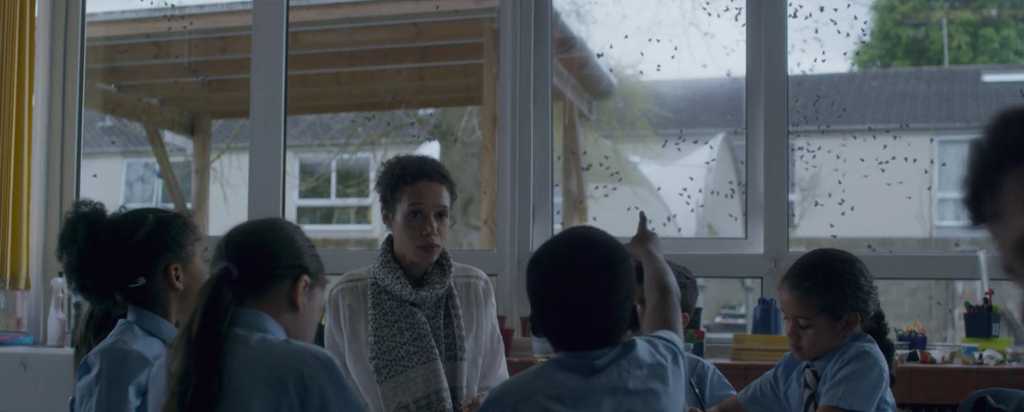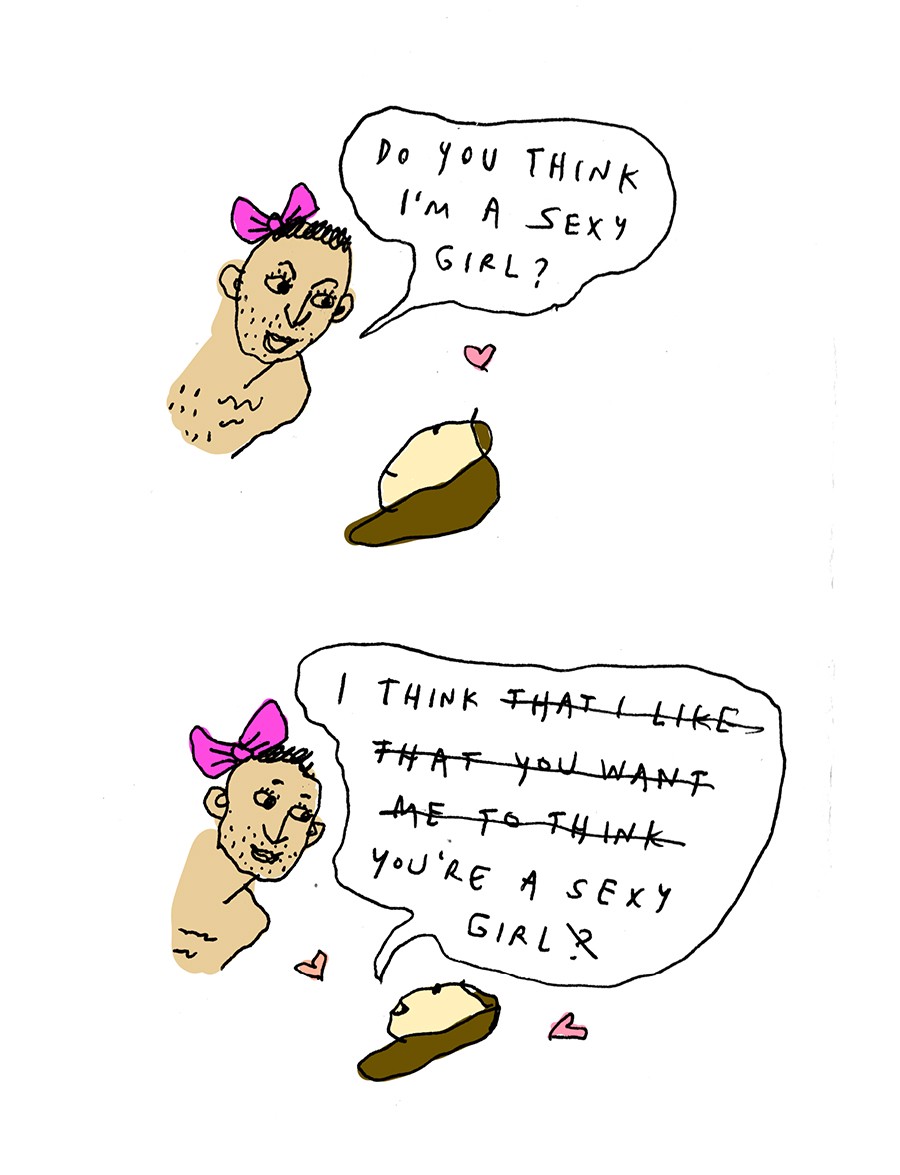Chaos In The CBD, "Subterranean Storm"
This Halloween, the Grim Reaper is a beacon of hope.

I have a theory about the Hillary Clinton email “revelation” of Friday which essentially says America is so exhausted with this election that it does not want to hear another fucking thing about it until it votes and collapses onto its couch next Tuesday night in an alcohol/leftover-Halloween-candy-induced coma from which it hopes to never wake up. Donald Trump’s accountant could come forward to reveal that the candidate is actually worth $972.06 and America would be like, “Shut the fuck up, we have already made up our minds.” The person at the Clinton Foundation responsible for procuring sabra prostitutes from the Mossad for Bill could hold a press conference announcing that he has video and America would say, “Get back to us around Christmas when we’ll need it, right now go away.” We’re just done, and no amount of unprecedented incompetence/interference/ass-covering is going to do anything for us (unless we are journalists, in which case we are no doubt thanking Satan for giving us one more chance to show the public just how quickly we will step all over each other to run anything we don’t fully understand so long as it is fed to us by a government source) other than make us a little sadder, a little more desperate for it to all be over.
Okay, I don’t mean to rub it in, but it’s Monday. Maybe this will relax you for a few minutes before you need to subject yourself to the new week. Enjoy.
New York City, October 27, 2016

★ By the time the drowsy children could be gotten out the door, a light cold rain was just beginning to fall. The bare places in the trees were apparent. A woman stopped with a stroller just outside the revolving doors, blocking them, as she fussed with the child’s cold-weather gear. The whole day was raw and dark. Sometimes there was a wrinkle in the clouds; sometimes the clouds were smooth. Sometimes the rain fell hard enough to streak the windows. At the first school pickup time, it had paused, but by the end of the afterschool program it was steady and soaking again, as the older boy trudged along uncomplainingly under his umbrella to help fetch the younger. In the dark, on the detour to and from the nearest possible grocery store, rain fell in long drips from building canopies, caught in the underlighting as it stretched, so that it looked slow and viscous.
Should You Spill Your Secrets In Couples' Therapy?
Two Divorce Lawyers Watch “Divorce”: Ep. 3
What the show gets right and wrong about divorce in New York
by Marcy Katz and Tom Kretchmar

The third episode of Divorce revolves around counseling sessions Frances and Robert attend with a remarkably reticent therapist in a final effort to save their marriage. They only make it through two sessions before they realize reconciliation’s a lost cause, by which point they’ve spilled new secrets: Frances admits she slept with Julian many more times than Robert imagined, and Robert confesses an emotional affair that would likely have turned physical, but for the timing of the 9/11 attacks. Although it’s unlikely these admissions would be materially relevant in their divorce litigation, they would nonetheless be fair game as trial evidence. That they were disclosed during couples’ therapy sessions doesn’t make them off-limits.
In New York, divorcing parents can’t even expect that their private, one-on-one therapy sessions will be off-limits in child custody litigation. Although “psychotherapist-patient privilege” ordinarily prevents someone (and their therapist) from being forced to disclose information from private sessions, that privilege is waived in child custody cases. As far back as 1977, the Appellate Division, Second Department (the appellate court that governs Westchester County, where Robert and Frances live) ruled that actively contesting custody puts a parent’s “mental and emotional well-being into issue,” and thus waives the psychotherapist-patient privilege.
For spouses in therapy and aware of these rules, there’s an inherent tension: they may be motivated or pushed to really open up in order to achieve a cathartic breakthrough; on the other hand, if the chances of reconciliation are legitimately slim, they may feel incentivized to hold back any admissions that would be prejudicial (like the Ferrari hypothetical from our discussion of the series premiere). There’s no easy solution, but it’s critical to stay vigilant about the potential consequences of anything said in counseling if reconciliation isn’t achieved.
Episode three also offers the greatest reveal, to date, of Robert and Frances’s financial story. Frances is an executive recruiter at a large Manhattan headhunting firm. While she seems to be professionally successful, it’s not clear how long she’s been in this line of work. Her friend Dallas (Talia Balsam) describes it as a “stupid” job Frances took to support the family after they moved to the suburbs so Robert could start his construction company (which we know from episode two isn’t doing very well).
It seems fairly probable that Frances is the higher earner in the family. If that’s the case, she should not, contrary to what Dallas tells her, expect to be entitled to alimony from Robert. (Also, the word “alimony” is outdated: these days the proper terminology is “maintenance” or “spousal support.”) It may very well be Frances who ends up paying Robert spousal support, rather than vice versa. (Child support is a separate story: even if Frances is the higher earner, she would be entitled to child support from Robert so long as she has primary physical custody of the children). Of course, it’s also possible that Frances isn’t a success at her headhunting job. If it turns out this is more of a stop-gap for her than a real career, we would expect her lawyers to try and make a lot of hay out of the fact that Frances, in support of Robert’s career ambitions, abandoned her own successes, aspirations and/or earning potential and followed him out to the suburbs. That type of argument is valid and common in divorce proceedings, and can have a legitimate impact on the financial results of a divorce settlement.
The word “alimony” is outdated: these days the proper terminology is “maintenance” or spousal support.”
Episode three also finds Frances back at the gallery space she checked out in episode two, eager to sign a lease and get the business started. If she had retained a divorce lawyer at this point, her lawyer would be telling her to be very careful with the timing. Now that she and Robert are on the cusp of divorce, many of their decisions should be made with an eye towards the “commencement date” — the day on which the proceedings are formally initiated by the filing of legal papers in a courthouse.
The commencement date of a New York divorce is important for many reasons: first, certain rules called the “automatic orders” immediately go into effect. The primary goal of them is to prevent spouses from transferring or spending marital funds for any purpose other than ordinary living expenses, ordinary business expenses, or attorney’s fees. Frances may run into problems if she uses marital funds to open the art gallery after the commencement date: Robert would have a very reasonable argument that operating an art gallery is not in the ordinary course of Frances’s business, and, therefore, that any marital savings she allocates towards the gallery (including towards its lease) is a violation of the automatic orders.
This would seem to incentivize Frances to try to get the lease signed before the formal commencement of their divorce, but it’s not so simple. Frances also has incentives to postpone her new business venture—commencement officially cuts off the accumulation of marital property, meaning that any business Frances starts after that date would, generally speaking, be her separate property, whereas any business started during the marriage and prior to the commencement date (e.g., Robert’s construction business) would be marital property, subject to equitable distribution.
By the end of episode three, it’s pretty clear that Frances wants to move forward with the gallery. She should be mindful of how these expenses might be treated in connection with any spousal support determination a court may make. When courts make support determinations, they don’t just look at the spouses’ respective income and assets. They also look at their monthly expenses, and their ability to meet their expenses with their available funds. If a court decides, given Frances’s existing job, that the gallery is primarily a vanity project, it may conclude that its operating costs should be treated as discretionary expenses rather than essential ones. In that case, the court may order Frances to pay Robert more spousal support than she would otherwise be able to afford on a budget that also accounts for her gallery costs.
Furthermore, if soon before or during the pendency of the divorce, Frances leaves her corporate gig to work at the gallery full-time, it’s likely — assuming her corporate salary was higher than whatever she’ll initially be earning from the gallery — that a court would implement a doctrine called “imputed income.” This would use her headhunter salary, rather than her gallery income, to make a spousal support determination, leaving her paying more support (if she’s the payor) or receiving less (if she’s the payee) than she might expect. In other words, Frances: don’t quit your day job yet.
Marcy Katz and Tom Kretchmar are New York divorce lawyers. They work at Chemtob, Moss & Forman, LLP, a matrimonial law firm based in midtown Manhattan.
The "Black Mirror" Episode About Bees Was Dumb
Why didn’t anyone in just put on a motorcycle helmet?

Charlie Brooker’s techno-thriller anthology “Black Mirror” is all about questions. Would recording your entire life be a gift or a curse? Would it be better to live forever in a computer, or die naturally? In its third season, released last week on Netflix, “Black Mirror” poses its hardest question of all: why did Black Mirror make an episode about mean bees?
With their high-concept premises, “Black Mirror” episodes are bound to be controversial. Some people don’t like the episode that centers around the prime minister having actual sex with an actual pig, for example. But the premise at the center of “Hated in the Nation” is so comically dumb, it makes all of “Black Mirror” look worse.
The British government made these robot bees to replace the regular bees that disappeared in colony collapse disorder. But someone has hacked the bees! Every day, people vote in a Twitter hashtag campaign on who the bees should kill. Then one unlucky person gets a bee in their head.
Cut to an endless series of scenes— the episode runs at a whopping ninety minutes — of British detectives trying to protect a series of unlikable people from bee-braining. At first, they don’t know why various social outcasts people —an Ann Coulter analogue, a rapper who made fun of a kid’s dancing — are getting killed by bees.
When the detectives realize that the bees are behind it, the episode turns into Sharknado but with bees, as the social media-crazed cyborgs hunt down their prey. The bees chase unpopular people down all over Britain — in one accidentally hilarious scenes, a little kid notices an ominous crew of bees on the window right before they murder his teacher.

Instead of getting the usual “Black Mirror” spooky vibe, though, I spent an hour-and-a-half wondering: why don’t these people just put something on their heads to stop the bees? All these unlikable people should just put on motorcycle helmets. We’re told the bees find their targets through facial recognition, a point we’re reminded of when the bees’ mastermind changes his hair and eye color to avoid his minions’ wrath. If the bees can’t see your face, you’re safe! And, more importantly, bees can’t crawl through your brain if you have a thick layer of fiberglass around it.
Apparently, though, motorcycle helmets don’t exist in “Black Mirror” world. In one scene, an entire SWAT team shows up to save a woman who disrespected a war memorial (a perennial issue in Britain). The police hustle her out of her apartment like there’s a sniper waiting to take a shot. Then, they spirit her to a creepy country cottage straight of Withnail and I, where the bees crawl through the vents and kill her anyway. Instead of going to all that trouble, the police should’ve just put a helmet on her head!
As assassination via bee gets more popular, the Chancellor of the Exchequer becomes their next target. As he frets over his impending bee murder, no one on his team suggests the obvious — just wearing a motorcycle helmet, or maybe at least one of those umbrella hats.
The bees eventually turn on all the people who are using them for social media murder. It’s a “Black Mirror” moral by way of Jon Ronson! Motorcycle helmets aside, though, the usual ominous “Black Mirror” ending is undermined here by the fact that — as teens’ devotion to Bee Movie proves — bees are inherently ridiculous.
Will Sommer is the senior editor at Washington City Paper.
Are You Being Served?
You don’t like what you’re seeing, you just don’t know that you have better options.

I want to share something with you from an article on Digiday today. Before I do I will warn you that the first sentence is about a woman who quit school to “pursue a career as a Snapchat influencer in Los Angeles.” You will find that sentence absurd and comical to the point of distraction, so I am telling you about it now to get that out of the way, because what I want to talk to you about is only tangentially related. Okay, ready? Let’s do this.
Sarah Peretz dropped out of college in Florida six months ago to pursue a career as a Snapchat influencer in Los Angeles. Her food-and-beauty-themed stories are done with art and humor, netting Peretz an average of five-digit views per Snap. She runs campaigns for brands like Taco Bell and beauty-and-wellness subscription service FabFitFun. She gives talks on Snapchat marketing at events like VidCon and the Video Summit in Leipzig, Germany.
But as her Snapchat fame grows, Peretz is becoming less confident in the platform: After Snapchat removed the autoplay feature, she noticed a big drop in her video view count. “It’s really difficult to explain to brands why I’ve lost 35 percent of my views on Snapchat,” said Peretz. “And it’s hard to find value in my decision when I can barely prove my influence after this plunge in views.”
Now, I am not a big user of Snapchat, but let me suggest that maybe the explanation for why she’s lost 35 percent of her views is 35% of them came from people who had no interest in watching them in the first place. This puts me in mind of something else recently in Digiday, from an article where publishers discuss Facebook. The head of audience development for Sky, talking about Facebook Live, says this: “There is so much live content, and I don’t believe people are consuming it because that’s what they want. It’s because that’s what’s being served.”
I am just going to make that a pull quote here because I feel as if it needs the extra emphasis.
“There is so much live content, and I don’t believe people are consuming it because that’s what they want. It’s because that’s what’s being served.”
Listen, I am not a genius. My brow is not particularly elevated. My tastes are no more refined than those of the next idiot who spends all day in front of a screen. I just watched an hour-long documentary on the late ‘70s/early ’80s TV show “The Incredible Hulk” because I saw it in the sidebar of a different video concerning the late ‘70s/early ’80s TV show “The Incredible Hulk.” I wasn’t watching old episodes of “The Seven Lively Arts,” is what I’m saying. If there had been a related documentary about the miniseries “V” you can bet your ass I would have clicked through that too.
But as shameful as those choices are (and I am aware that you have already lost so much respect for me that you will never accept my wise counsel with the same degree of unquestioning reverence again) they were choices I made on my own. They were not fed to me. They did not start up automatically in the hopes that I would be too lazy or doltish to click away. My “attention” was not sold as a commodity to some bullshit brand by a platform partner who is complicit in the lie that I was in any way engaged with its content. Whoever got my pre-roll view got the view of someone who was (shamefully) interested in watching content about or related to the late ‘70s/early ’80s TV show “The Incredible Hulk.”
Everything is lies. Everybody knows this. The people who are telling these lies know it better than anyone else, because they are desperate to make whatever money they can off of their scam before the people splashing out the cash decide that their tolerance for this level of deceit can no longer be justified to their superiors.
Why do I keep repeating this? Because every day we are presented with stories about how the future is video [which no one wants], how seeing something for a second counts as interaction with it [when it takes at least two seconds to figure out that you need to turn it off], and how the bright new stars are platform influencers [who we pretend aren’t the freak show performers of our age]. We are all supposed to nod and go along with the lies, and mostly we do. Why? Because it’s easier. Because it’s depressing to realize how much of what we are told is lies. Because that’s what being served. I don’t want you to buy into the lie that this is how things are or how they should be.
Do you think the people who sell you these lies feel bad about it? I doubt it. I am sure they have already constructed their own mental narratives about progress and the future and giving an audience what it wants. In the end it doesn’t matter. When they succeed — and, given all the reasons above, they will succeed — they will maybe have the occasional pang of guilt for the way in which they helped make everything worse, but the large amount of money they made along the way will be an amazing salve to whatever prick of conscience they are briefly stung by. I need to stop talking about this, because it makes me angry, and you wouldn’t like me when I’m angry.
Are Pets Children?
Whom Care?
Call your dumb family whatever you want

Today, online, someone had an opinion. This one was about which words people are and are not allowed to use, which is always a fruitful road to walk down.
The piece was called “Pets Are Not Children, So Stop Calling Them That,” and it ran this morning on New York Magazine’s The Cut, tagged as a parenting post:
Parenting is our connection to the future, the means by which we attempt to influence what tomorrow’s world will be. When people with pets take the title of “parent” and blur the line between pets and children, our language is distorted in a way that only adds to our confusion and anxiety. It may be a gentle delusion to think of your pet as your “child,” but it’s still a delusion. Misnaming our relationship with pets isn’t just a lighthearted goof. It’s a retreat from the world.
Replace “pets” and “children” with any other two low-stakes nouns in this scenario and see if you can muster up the audacity give a shit. “Nanas are not meemaws, so stop calling them that.” “Junior archery counselors are not archery counselors,” etc. Not only do I still not feel strongly, but I’d love to avoid talking to the person who does! Imagine being at a party and accidentally touching upon this topic, and then having to hear this person’s five minute outline of their own parameters and rules for the distinctions between pets and children. Gut me. Flay me. Call me to the kitchen, I need an out.
“Pets,” they might say to you, with a serious look in their eye and a cocktail in their hand. “Are animals like dogs and cats. And children… are not.”
Here’s the thing: Your personal taste is not a hard-wired objective guide for operating within the world. It’s just a system of tips and tricks you’ve found along the way that don’t ruffle your own feathers. Congratulations on not pissing yourself off every waking moment, but presenting your personal preferences to me with a hard binary rubric as though I am suddenly beholden to pick a side is… divorced from reality. It happens on social media all the time, but when it leaks into the opinions column media circuit and becomes an hours-long cross-platform conversation, my bowels evacuate.
“Pets and children,” my Twitter feed was tweeting this morning. “Children and pets.”
I would love, if at all possible, when a piece like this comes out, for people to just go, “Huh,” and then not click on it. “Hm seems dumb,” and then just trust that it is. I know this is not possible, because people love punishment (specifically punishing themselves with really bad art all of the time), but this is my dream and I’m daring to dream it.
So, hey, the next time you see a headline like this, and it sounds like it was written by a troll with a pseudonym to garner the clicks of people who like to look at things and say, “At least I’m not that idiot!” just remember you don’t have to if you don’t want to. Whom care.
Sexy Girl
The Adventures of Liana Finck

Liana Finck’s cartoons appear regularly in The New Yorker. Her book is A Bintel Brief. This cartoon strip is a spin-off of her Instagram feed, @lianafinck.
Earth Trax, "Flowers"
You can officially ask this week how your ass tastes.

You started this week with one goal in mind: living long enough to see Friday. The road was hard, the obstacles against you seemingly insurmountable. At times — Remember Tuesday? Remember Wednesday? Let’s not even talk about Thursday, because it’s still too raw — you didn’t think you’d make it. You were ready to give up. But something inside of you said “No, I can do this. I am not going let this week get the best of me. I will fuck this week until it loves me.” And you did it. You did it. You made it to Friday. Your reward is two days before you have to start all over again. Here’s some bouncy house music to play you over the finish line. Enjoy. You’re a fucking hero, and don’t let anyone tell you different.
New York City, October 26, 2016

★★★ The sun rose later still, making it even harder to get up and out the door, and then it pushed the school-bound children along the sidewalk. A crow flew straight down Fifth Avenue, with laboring wingbeats, crying out as it went. The wind came up under an untucked shirttail as a signboard offered to freeze away belly fat. The light thinned but remained precise for a while, till eventually shadows disappeared. Dinnertime felt as if it were the depths of night.
Berlioz's 'Symphonie Fantastique' Is About Running Into Your Ex In Hell

Last week I posed the question of the spookiest piece of music, decidedly landing on Saint-Saëns’s Danse Macabre. I wouldn’t go back on the claim — I 100% stand by the rattling xylophone bones! — but I also argued Danse Macabre is campy. It’s the ’80s horror movie of classical music. You jump a little, maybe, the first time you experience it, but you’re also laughing. And if Danse Macabre is Nightmare On Elm Street? Then Hector Berlioz’s Symphonie Fantastique is The VVitch.
I’ve been reading a book by Thomas Forrest Kelly called First Nights, which details five historic premieres of classical music. In 1830 — so more than forty years before Saint-Saëns (1874), and sixty years before Dvořák (1893), Hector Berlioz — a young, red-headed French composer — debuted his five-part symphony with a program. Symphony programs up until that point just listed the pieces you were about to hear and who they were by, rather than what any of the pieces were about. At its premiere in December 1830, Berlioz laid out the entire story of Symphonie Fantastique for his audience, detailing a story about a Parisian artist [thinking emoji] scorned by a woman [three thinking emojis].
The first three movements of the piece detail the two young lovers, meeting and dancing, only for his insecurities to interfere with their relationship. Convinced their love is doomed, the young artist attempts to poison himself, except he mostly just overdoses on opium and has a wild trip. In the fourth movement, he imagines he kills his lover, and is marched to his own death. In the fifth movement, the artist finds himself in Hell, witnessing an orgy of witches—and who’s right in the middle of this? Well, you better believe it’s his lover! Then the whole thing ends there, in Hell. Quite a turn! Prior symphonies had been ruminations on themes and keys and melodies; this was the first sort of literary symphony — one with a story, long outdating tone poems and other programmatic pieces of music.
There is so much to discuss with Symphonie Fantastique, but because it’s coming on Halloween, and because of WITCHES, I’m just going to focus on that fifth movement for the time being, known as Songe d’une nuit de sabbat, or, Dream of the Night of the Sabbath. It’s an eccentrically creepy piece, mixing fairly upbeat violin and woodwind melodies (the witches!) with loud, deafening brass (the Devil!). There’s a version of the Dies irae, a Latin hymn depicting Judgment Day, used throughout. It’s altogether dissonant and infernal. I mean, the guy is writing about running into his ex whom he murdered while they’re both in Hell. Talk about a bad Halloween!!
I think a lot about the chimes in this piece, which ring in hauntingly around the middle of the movement. Chimes — or tubular bells — are a giant set of upright bells played with big, felt-tipped mallets, and often sound the same as church bells. They echo throughout any performance space in a powerful, nearly obnoxious way, and they were scarcely used in most orchestral music at this point unless it was religious in nature. In the 1830s, the use of a holy instrument to represent a twisted version of Hell is… pretty fucked up!
The story behind Symphonie Fantastique is the kind of thing that would feel abstract and wild, even in present day. We’d look at it and say, “man, this guy wrote a symphony about a version of himself,” and roll our eyes the way we do when Young Literary Men do it now. It was certainly not the first time an artist of any capacity had written a “version” of themselves in their own art (this was common enough by the 1830s), but I can’t let go of the idea of writing yourself having a crazy opium trip where you commit and murder and then see your own death and then go to Hell. Extremely metal and/or just stupid, I can’t really decide.
It helped, I suppose, that Berlioz had a wild love life. Berlioz wrote Symphonie Fantastique about his main crush, an actress named Harriet Smithson, to whom he wrote letters all the time and who never wrote him back. This is the “scorning” the symphony is about: a more famous woman just did not acknowledge a less famous man which is FINE and she had EVERY RIGHT TO DO SO. In the meantime, Berlioz got engaged to Camille Moke, a woman who was essentially his co-worker, in part because she told him that Harriet Smithson was NOT REALLY ALL THAT GREAT and had for sure HAD SEX FOR MONEY before (whether this was true remains to be seen, and in my personal opinion…? It was a lie). Said engagement came after the premiere of Symphonie Fantastique, which was sort of the official social welcoming of Berlioz into high society. This has little to do with anything, but there is a transcript of a letter Berlioz wrote to his friend in which he writes: “Ever since [Camille] heard my Sabbath, [she] calls me only ‘her dear Lucifer, her dear Satan.’”
[screams for 10,000 years]
Regardless, while Berlioz was engaged to Camille Moke, she went on vacation and then wrote him a letter saying she cheated on him and was now engaged to someone else. So then Berlioz crafted an actual plan — not a here’s what the symphony is about plan — to murder Camille and her mother and her new fiancé, but he never did it. It’s at that point that I’m like, “Hm, maybe Berlioz is not a good guy,” even though I definitely should have thought that sooner. What does wind up happening, of course, is that at the second big performance of Symphonie Fantastique, who should show up other than HARRIET SMITHSON. And her reaction is like, “Wow, this is the guy I’ve ignored the whole time? He seems… hot and cool.” They wind up getting married — a classic twist — and making each other very miserable for several years before separating. To my knowledge, she never referred to him as “my dear Lucifer” or “my dear Satan,” but you gotta hope.
Okay, anyway, the point of this is: Everyone who has scorned you will show up in Hell right alongside you! Happy Halloween!
Fran Hoepfner is a writer who used to be a musician, but not in an acoustic guitar sense, more in the the movie Whiplash sense. As kids her age discovered the popular music of the early ’00s , Fran spent 10–15 hours a week in private lessons for piano or playing timpani in several Chicagoland youth symphonies. Because of that, she didn’t discover pop music until 2008, and now her music library is almost exclusively classical. You should listen to more classical music, not for any self-important reason, but just because it’s more accessible than you think it is. Also it’s very good.
